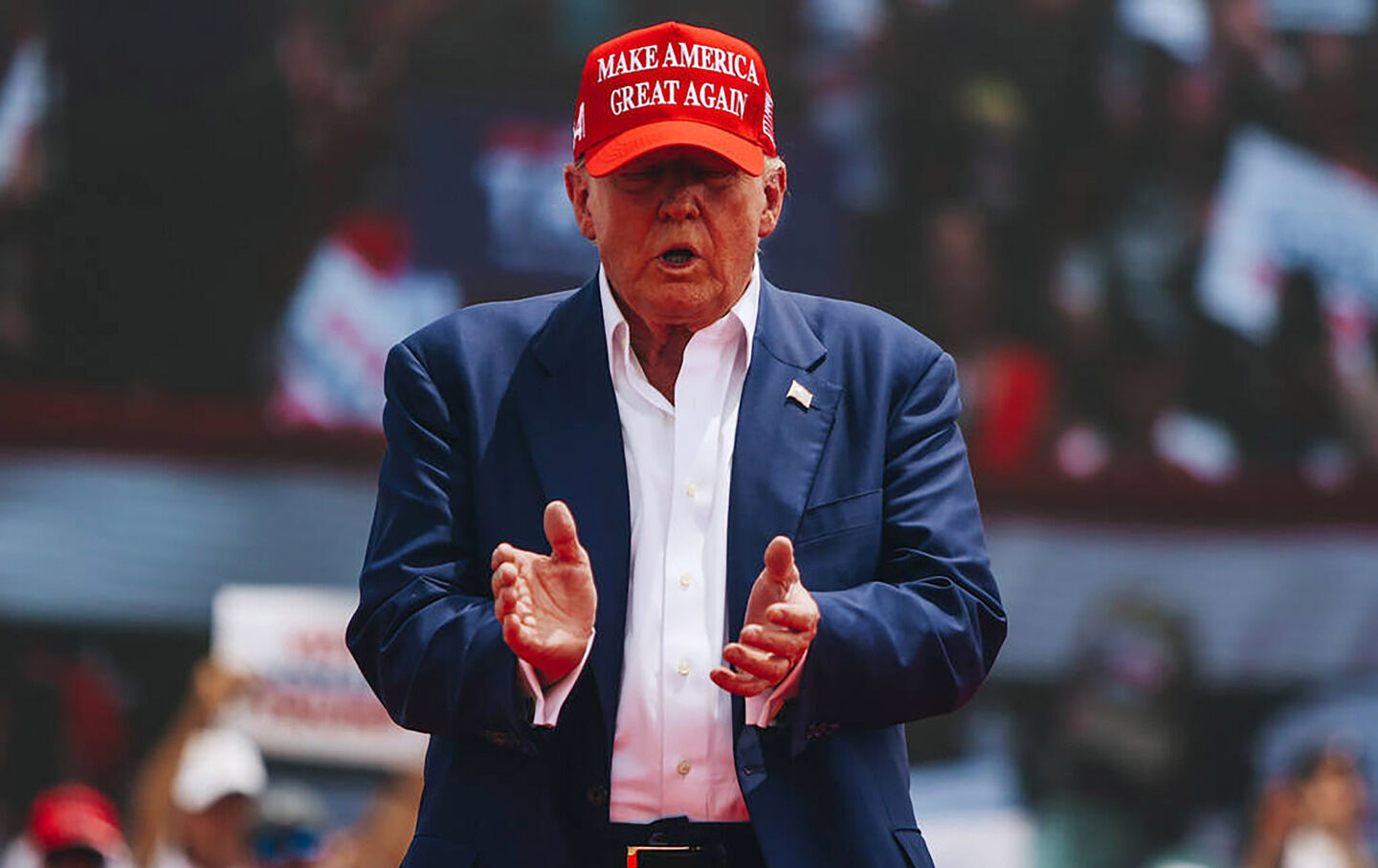Trump Versus the Sharks
On this episode of The Time of Monsters, Chris Lehmann on how gibberish resonates with the MAGA base.

Here's where to find podcasts from The Nation. Political talk without the boring parts, featuring the writers, activists and artists who shape the news, from a progressive perspective.
On this episode of The Time of Monsters, Chris Lehmann joins Jeet Heer to discuss Trump's obsession with sharks.
Donald Trump does not like sharks. During his memorable encounter with Stormy Daniels, he fixated on a documentary about the predator that was playing on the hotel television and muttered, “I hope all the sharks die.” The former president returned to this topic at a recent campaign rally where he went on bizarre and lengthy digression asking what would be worse, being electrocuted or being eaten by a shark? Trump said he thought a shark attack would worse.
It's easy to dismiss Trump’s rantings as mere gibberish but my Nation colleague has written incisively on how this rhetoric should be understood not as logic but as an emotional and religious appeal. Chris joined me to talk about Trump’s appeal to his MAGA base. We also take up how Trump is increasingly aligned with Christian nationalism (a topic Chris wrote about here) and how the mainstream media doesn’t offer enough cultural context to make clear just how dangerous Trump’s rhetoric is.
Advertising Inquiries: https://redcircle.com/brands
Privacy & Opt-Out: https://redcircle.com/privacy

Former president Donald Trump speaks at a rally at Sunset Park on Sunday, June 9, 2024, in Las Vegas.
(Madeline Carter / Las Vegas Review-Journal / Tribune News Service via Getty Images)Donald Trump does not like sharks. During his memorable encounter with Stormy Daniels, he fixated on a documentary about the predator that was playing on the hotel television and muttered, “I hope all the sharks die.” The former president returned to this topic at a recent campaign rally where he went on bizarre and lengthy digression asking what would be worse, being electrocuted or being eaten by a shark? Trump said he thought a shark attack would be the worst way to go.
It’s easy to dismiss Trump’s rantings as mere gibberish, but my Nation colleague has written incisively on how this rhetoric should be understood not as logic but as an emotional and religious appeal. Chris joined me to talk about Trump’s appeal to his MAGA base. We also take up how Trump is increasingly aligned with Christian nationalism (a topic Chris wrote about here) and how the mainstream media doesn’t offer enough cultural context to make clear just how dangerous Trump’s rhetoric is.

Here's where to find podcasts from The Nation. Political talk without the boring parts, featuring the writers, activists and artists who shape the news, from a progressive perspective.
On this episode of The Time of Monsters, Jeet Heer is joined by Matt Duss to discuss Trump's anti-war pitch.
Advertising Inquiries: https://redcircle.com/brands
Privacy & Opt-Out: https://redcircle.com/privacy
Subscribe to The Nation to Support all of our podcasts
We cannot back down
We now confront a second Trump presidency.
There’s not a moment to lose. We must harness our fears, our grief, and yes, our anger, to resist the dangerous policies Donald Trump will unleash on our country. We rededicate ourselves to our role as journalists and writers of principle and conscience.
Today, we also steel ourselves for the fight ahead. It will demand a fearless spirit, an informed mind, wise analysis, and humane resistance. We face the enactment of Project 2025, a far-right supreme court, political authoritarianism, increasing inequality and record homelessness, a looming climate crisis, and conflicts abroad. The Nation will expose and propose, nurture investigative reporting, and stand together as a community to keep hope and possibility alive. The Nation’s work will continue—as it has in good and not-so-good times—to develop alternative ideas and visions, to deepen our mission of truth-telling and deep reporting, and to further solidarity in a nation divided.
Armed with a remarkable 160 years of bold, independent journalism, our mandate today remains the same as when abolitionists first founded The Nation—to uphold the principles of democracy and freedom, serve as a beacon through the darkest days of resistance, and to envision and struggle for a brighter future.
The day is dark, the forces arrayed are tenacious, but as the late Nation editorial board member Toni Morrison wrote “No! This is precisely the time when artists go to work. There is no time for despair, no place for self-pity, no need for silence, no room for fear. We speak, we write, we do language. That is how civilizations heal.”
I urge you to stand with The Nation and donate today.
Onwards,
Katrina vanden Heuvel
Editorial Director and Publisher, The Nation
